Health
Polio Cases Spike in Conflict Zones as Global Immunization Rates Decline: UNICEF Warns on World Polio Day

By Muhammad Jamil Abubakar
The United Nation Children’s Fund, UNICEF has released a new analysis revealing that of the 541 children affected by polio globally in 2023, 85 percent live in 31 countries marked by conflict, instability, and humanitarian crises.
The analysis shows that polio cases in these settings have more than doubled over the past five years, while routine childhood immunization rates have fallen from 75 percent to 70 percent—far below the 95 percent threshold required for community immunity.
The data underscores a critical warning: polio, a life-threatening disease, continues to thrive in areas where healthcare delivery is severely hampered by conflict, natural disasters, and other destabilizing factors.
The UNICEF Executive Director Catherine Russell emphasized the dire situation, stating, “In conflict, children face more than bombs and bullets; they are at risk of deadly diseases that should no longer exist.”
She noted the breakdown of healthcare systems, destruction of infrastructure, and mass displacement as key factors driving a resurgence of preventable diseases like polio.
The resurgence is particularly evident in conflict-affected regions, with 15 out of 21 countries battling polio outbreaks, including Afghanistan, the Democratic Republic of Congo, Somalia, South Sudan, and Yemen. A global decline in childhood immunization has contributed to these outbreaks, even in nations that had been polio-free for decades.
UNICEF and its partners have intensified emergency vaccination efforts in response to the recent upsurge.
In Gaza, a September vaccination campaign reached nearly 600,000 children under the age of 10, following the reappearance of polio in the region after a 25-year absence. However, renewed violence and mass displacement have delayed efforts in northern Gaza.
In Sudan, the impact of conflict has been equally devastating, with national childhood vaccination coverage plummeting from 85 percent before the war to 53 percent in 2023. In active conflict zones, the coverage has dropped further to just 30 percent. UNICEF has responded with two emergency polio vaccination campaigns, reaching 2.9 million children under five years old.
UNICEF is urging governments, partners, and donors to take decisive actions to stop polio transmission in conflict-affected and vulnerable countries.
The organization, which delivers over 1 billion doses of polio vaccines annually, called for prioritizing immunization efforts, particularly in regions with low coverage in Africa and Asia. It also emphasized the need to strengthen healthcare systems, ensure the safety of humanitarian workers delivering vaccines, and secure humanitarian pauses to allow safe vaccination campaigns.
UNICEF highlighted the importance of supporting the Global Polio Eradication Initiative and Gavi, the Vaccine Alliance, to quickly respond to outbreaks and prevent further cases.
Additionally, the organization is calling on political leaders to prioritize polio eradication, promote innovative solutions, and coordinate efforts to enhance immunization quality.
“The spread of polio not only puts children in affected countries at immediate risk but also poses a growing threat to neighboring regions,” said Russell.
“The final push is the hardest, but now is the time to act. We cannot rest until every child, in every corner of the world, is safe from polio once and for all.”
As polio cases continue to rise in some of the world’s most challenging environments, UNICEF’s analysis serves as a stark reminder of the urgent need for global action to protect the most vulnerable children from this preventable disease.
Health
Gombe Hosts National Nursing Workshop, Urges Review of Curriculum and Embrace of AI in Healthcare
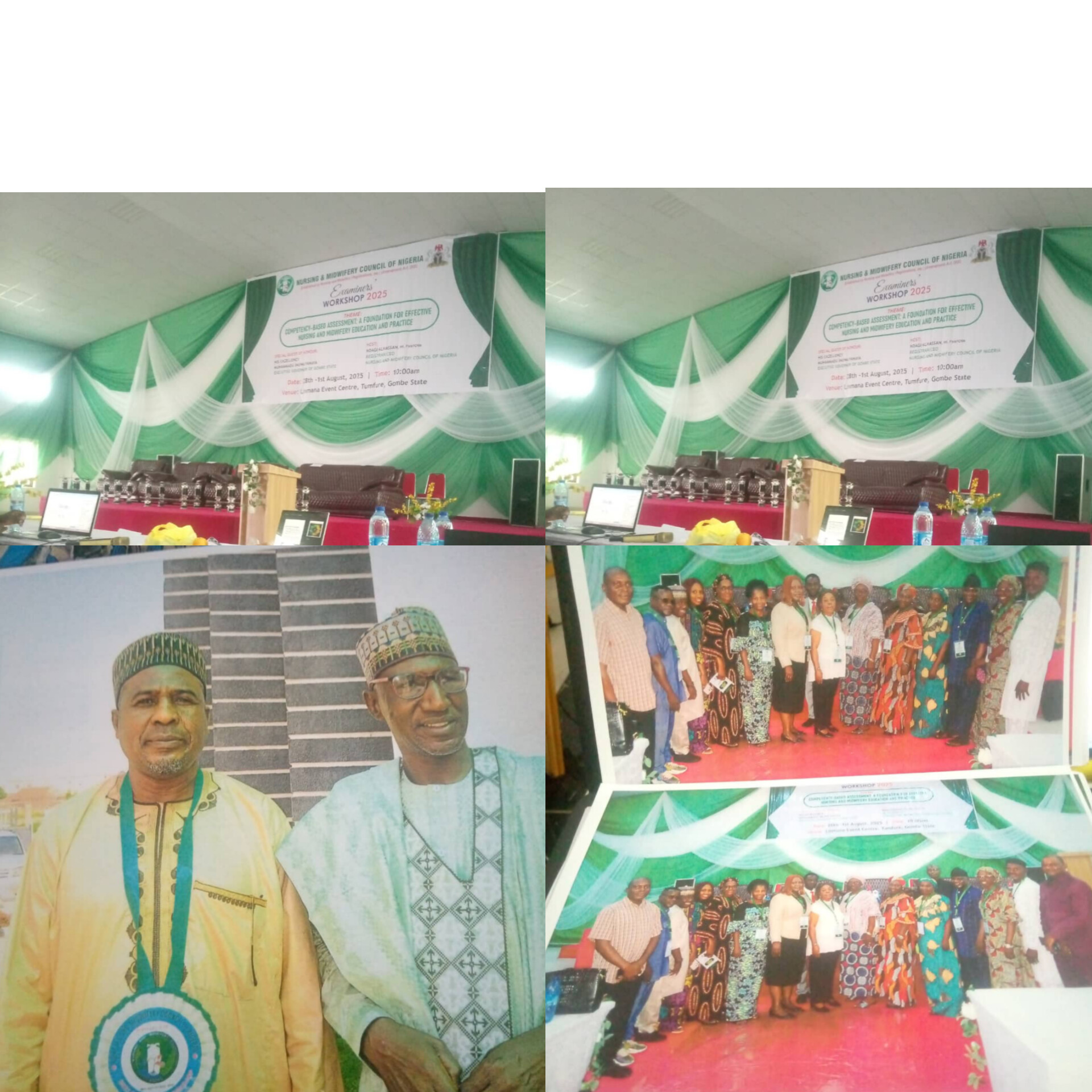
By Editor Daily Facts
Nurses and midwives across Nigeria have been charged to uphold professionalism, compassion, and adaptability in delivering quality healthcare services, as Gombe State hosted the 2025 National Examiners Workshop organized by the Nursing and Midwifery Council of Nigeria.
Declaring the workshop open on Tuesday in Gombe, Governor Muhammadu Inuwa Yahaya, represented by the Commissioner for Health, Dr. Habu Dahiru, commended the Council for selecting Gombe State to host the crucial event. He emphasized the commitment of his administration to improving the health sector through policy reforms, infrastructure development, and capacity building.
“We have prioritized the health sector by upgrading Primary Healthcare Centres (PHCs) across all 114 wards in the state. This is to provide an enabling environment for healthcare professionals, including nurses and midwives, to deliver effective services,” Dr. Dahiru said.
He revealed that the state government has made significant improvements to the welfare of nurses and midwives, and urged them to show empathy in dealing with patients.
Dr. Dahiru also used the platform to call for a comprehensive review of the national nursing and midwifery training curriculum. He noted that the advent of Artificial Intelligence (AI) and other technological innovations in the global healthcare landscape demands that Nigerian practitioners adapt to modern trends.
“This is the time to update the training manual to reflect emerging realities. The future of healthcare lies in innovation, and nurses—especially those in rural communities—must be equipped with the skills and knowledge to meet these evolving challenges,” he added.
The guest speaker, Professor Saleh Garba, lauded the organizers of the workshop and urged participants to make practical use of the knowledge and skills acquired during the training. He described the workshop as a vital platform for updating participants on global best practices in nursing and midwifery education.
Also speaking at the event, the Emir of Akko, Alhaji Umar Muhammad Atiku, described nurses and midwives as pivotal members of society who contribute meaningfully to community well-being. He appealed to all levels of government to prioritize investment in their welfare for improved service delivery.
The theme of the 2025 workshop, “Competency-Based Assessment: A Foundation for Effective Nursing and Midwifery Education and Practice,” underscores the need for a modernized, skills-based approach to training that aligns with international standards.
The workshop brought together examiners, educators, health professionals, and stakeholders who deliberated on critical aspects of nursing education, including curriculum review, assessment methods, and integration of emerging technologies.
As the healthcare sector continues to evolve, stakeholders at the workshop agreed that the challenge ahead lies in how quickly nurses and midwives can adapt to change—not only to enhance service delivery but also to strengthen the nation’s overall health system.
ENDS
Health
Gombe Hosts National Nursing Workshop, Urges Review of Curriculum and Embrace of AI in Healthcare
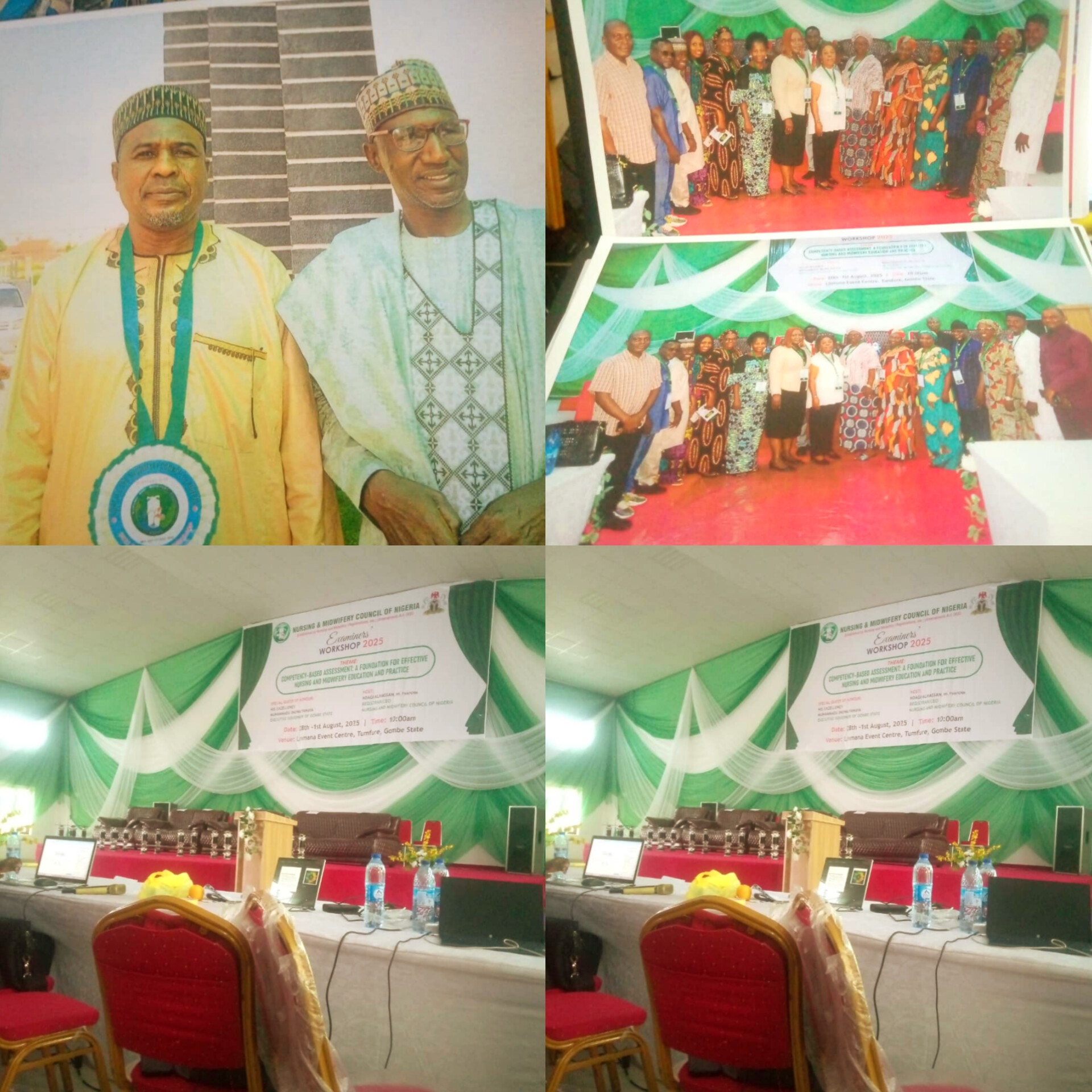
By Editor Daily Facts
Nurses and midwives across Nigeria have been charged to uphold professionalism, compassion, and adaptability in delivering quality healthcare services, as Gombe State hosted the 2025 National Examiners Workshop organized by the Nursing and Midwifery Council of Nigeria.
Declaring the workshop open on Tuesday in Gombe, Governor Muhammadu Inuwa Yahaya, represented by the Commissioner for Health, Dr. Habu Dahiru, commended the Council for selecting Gombe State to host the crucial event. He emphasized the commitment of his administration to improving the health sector through policy reforms, infrastructure development, and capacity building.
“We have prioritized the health sector by upgrading Primary Healthcare Centres (PHCs) across all 114 wards in the state. This is to provide an enabling environment for healthcare professionals, including nurses and midwives, to deliver effective services,” Dr. Dahiru said.
He revealed that the state government has made significant improvements to the welfare of nurses and midwives, and urged them to show empathy in dealing with patients.
Dr. Dahiru also used the platform to call for a comprehensive review of the national nursing and midwifery training curriculum. He noted that the advent of Artificial Intelligence (AI) and other technological innovations in the global healthcare landscape demands that Nigerian practitioners adapt to modern trends.
“This is the time to update the training manual to reflect emerging realities. The future of healthcare lies in innovation, and nurses—especially those in rural communities—must be equipped with the skills and knowledge to meet these evolving challenges,” he added.
The guest speaker, Professor Saleh Garba, lauded the organizers of the workshop and urged participants to make practical use of the knowledge and skills acquired during the training. He described the workshop as a vital platform for updating participants on global best practices in nursing and midwifery education.
Also speaking at the event, the Emir of Akko, Alhaji Umar Muhammad Atiku, described nurses and midwives as pivotal members of society who contribute meaningfully to community well-being. He appealed to all levels of government to prioritize investment in their welfare for improved service delivery.
The theme of the 2025 workshop, “Competency-Based Assessment: A Foundation for Effective Nursing and Midwifery Education and Practice,” underscores the need for a modernized, skills-based approach to training that aligns with international standards.
The workshop brought together examiners, educators, health professionals, and stakeholders who deliberated on critical aspects of nursing education, including curriculum review, assessment methods, and integration of emerging technologies.
As the healthcare sector continues to evolve, stakeholders at the workshop agreed that the challenge ahead lies in how quickly nurses and midwives can adapt to change—not only to enhance service delivery but also to strengthen the nation’s overall health system.
ENDS
Health
Gombe State Strengthens Health Sector with Four-Day Capacity Building for Health Managers

By Muhammad Jamil Abubakar
The Gombe State Government has commenced a four-day capacity development workshop for health managers and leaders, aimed at improving the state’s Annual Operational Plans (AOP) and enhancing healthcare delivery systems. The initiative is supported by the Nigeria Health Sector Renewal Investment Initiative (NHSRII) in collaboration with key development partners.
Speaking at the opening of the workshop, Gombe State Commissioner for Health, Dr. Habu Dahiru represented by the Permanent Secretary of the Ministry, Dr. Ibrahim Yakubustated that the training will empower health personnel to effectively plan and execute health interventions across the state. He emphasized the ministry’s commitment to ensuring no stakeholder is left behind in driving progress in the health sector.
“The AOP reflects all activities scheduled for the year and will guide service delivery in both rural and urban communities,” Dr. Yakubu said, noting that the initiative aligns with Governor Muhammadu Inuwa Yahaya’s strong support for health sector reforms in the state.
Also addressing participants, the Director of Planning, Research and Statistics at the Ministry of Health, Dr. Suraj Abdulkarim, said the workshop is historic, as it marks the first time the Sector Wide Approach (SWAp) a strategic planning and coordination model has been fully adopted in Nigeria at the sub-national level.
He explained that last year’s operational plan identified key priorities, especially those targeting women, children, and newborns, in line with national and global health targets. Nigeria currently contributes nearly 25% of global maternal mortality, a burden the Gombe government aims to reduce through focused interventions.
Dr. Abdulkarim also highlighted the MAMMI program initiated by the state government, which focuses on six key areas including maternal health. A unit has been established to monitor and improve healthcare delivery at the primary, secondary, and tertiary levels.
The program also addresses human resources for health. Measures are being put in place to assess available skilled personnel, deploy them strategically across the state, and provide incentives such as rural accommodation and motivation packages to retain staff in underserved areas.
Improved data collection and evidence-based decision-making are also priorities under the program.
Dr. Tolu Adeniji, a Consultant Public Health Physician with NHSRII, described the training as a cascade model that builds leadership, systems thinking, and problem-solving capacity at all levels of government. According to him, the initiative stems from a national agreement between the Nigeria Governors Forum, the Ministry of Health, and the Presidency to harmonize health efforts and improve key performance indicators across states.
Dr. Adeniji said the workshop will enhance planning capacity within Ministries, Departments, and Agencies (MDAs), with lessons from the training to be scaled down to local government health teams ensuring inclusive and sustainable improvements in healthcare delivery in Gombe State.
-

 Leadership12 months ago
Leadership12 months agoBreaking: African Union Appoints Pantami as Co-Chair of the 4th Industrial Revolution Policy Council
-

 Politics1 year ago
Politics1 year agoFormer Gombe State APC Promoters Forum Chairman Attacked Following Political Commentary
-

 Appointment10 months ago
Appointment10 months agoGombe State Indigene, Appointed New Vice Chancellor (ATBU)
-
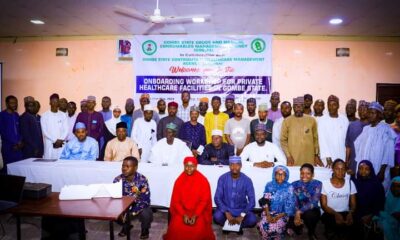
 Health1 year ago
Health1 year agoGombe State Organizes Onboarding Workshop for Private Healthcare Facilities
-
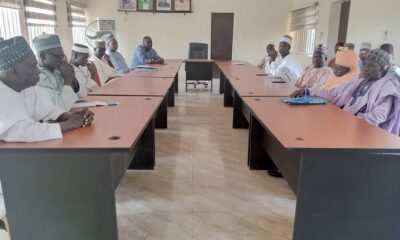
 Water1 year ago
Water1 year agoGombe Government Mobilizes Stakeholders to Combat Illegal Water Connections
-
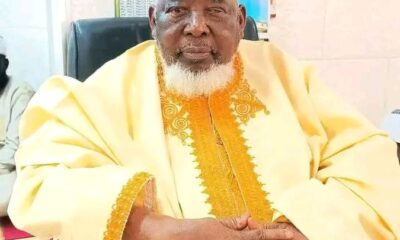
 Death5 months ago
Death5 months agoProminent Nigerian Islamic Scholar, Sheikh Sa’idu Hassan Jingir, Passes Away
-
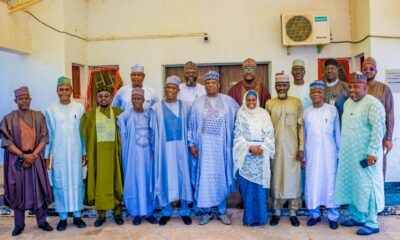
 Politics1 year ago
Politics1 year agoGombe State Inaugurates Human Capital Development Council
-

 Politics1 year ago
Politics1 year agoGombe State Launches Presidential Palliative Program (PPP) to Aid Small Businesses
